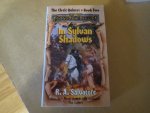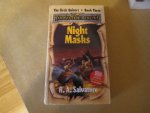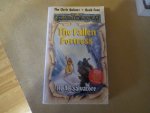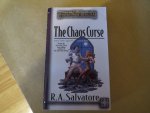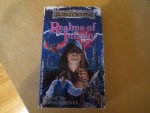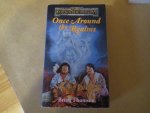#028 In Sylvan Shadows by RA Salvatore (Cleric 2)
Read 20/11/19 to 23/11/19
View attachment 116022
Book 2- and more of the same, except this time the action switches to the elven forest kingdom of Shilmista, which is just down the road from the Edificant Library, home (perhaps, perhaps not) to the heroes from the last novel- and specifically Cadderly and his lady-love Danica, the Bouldershoulder brothers have already left the building.
It's back in the library that we meet, and initial learn to dislike Prince Elbereth, sent by the aforementioned (soon to be besieged) kingdom. Cadderly doesn't get Elbereth- and vice-versa, however it's clear from the start that the Elf does however appreciate Danica.
Meantime the bad guys (of Talona) have shuffled the pack, Ragnor the Ogrillon is the bad guy du jour- leading his Goblin, Orc, Orog, Ogre & Giant army against the Elves. Although Aballister's Imp Druzil, and his second in command- Dorigen (another Wizard) are also in the mix.
Soon after we all decamp to the Shilmista forest where things quickly start to go badly for the good guys- Ragnor's army may not be bright but there are a lot of them.
Oh, and Rufo is still with the good guys, and he's still the weakest link.
Oh, and then Ivan and Pikel Bouldershoulder tip up and it's full on Dwarf-fury.
And so it goes- more fighting, more risk, greater setbacks- there really is a lot of action in this one.
Anyway, Elbereth's dad (the Elf King) doesn't believe in his lad- he's for cutting and running... and in the middle of it all- while the Elves continue to die, and lose the battle, Cadderly continues to be revolted by death (and having to partake of it).
So, Cadderly is going to have to sort it all out- to use his great big brain to work out a way out of this mess for the Elves, for his friends, for himself.
Which, of course, he does.
It's all great, and yet somehow... not as good as the first one, perhaps there just isn't enough Cadderly for me here. This is Salvatore- Cadderly is a lot like Drizzt, in the way that all heroes possess similar talents/foibles et al. They both fret about who they are, what they are, and what they have to do to survive.
Oh, and at this point it's worth making mention of the fact that you dear reader know that Cadderly is the son of the very bad man- Aballister. Cadderly, of course, doesn't know this.
So, Cadderly continues to fret, seethe and get angsty about a variety of things. He is however blessed (as stated above) of a great big brain- which seems to be able to soak up every scrap of info that is thrown/shown to it. Thus our hero solves the problem- not with violence, that's what the vicious Elf Prince, his girlfriend- Danica, and the Bouldershoulder bros are for.
And that, possibly- for me, is the slight disconnect.
Cadderly solves the problems, thinks things through- says the right thing, the rest of the guys do 90% of the killing/fighting action. It must be tough to write this, knowing that your main guy has got to stand outside the spotlight for a good chunk of the action. The pay off being it's a five book series so you've got time on your hands.
It's good, but not as good as the desperate, but in control, Cadderly- forced to do bad things (to Undead- much easier) in the previous novel. Probably, I think, but still a cracking read.
Read.

